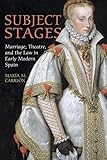Subject Stages : Marriage, Theatre and the Law in Early Modern Spain / Maria M. Carrion.
Material type: TextPublisher: Toronto : University of Toronto Press, [2010]Copyright date: ©2010Description: 1 online resource (240 p.)Content type:
TextPublisher: Toronto : University of Toronto Press, [2010]Copyright date: ©2010Description: 1 online resource (240 p.)Content type: - 9781442641082
- 9781442686519
- 862/.3093543
- online - DeGruyter
| Item type | Current library | Call number | URL | Status | Notes | Barcode | |
|---|---|---|---|---|---|---|---|
 eBook
eBook
|
Biblioteca "Angelicum" Pont. Univ. S.Tommaso d'Aquino Nuvola online | online - DeGruyter (Browse shelf(Opens below)) | Online access | Not for loan (Accesso limitato) | Accesso per gli utenti autorizzati / Access for authorized users | (dgr)9781442686519 |
Frontmatter -- Contents -- List of Illustrations -- List of Abbreviations -- Author’s Note -- Introduction -- 1. Marital Law and Order in Early Modern Spain -- 2. Marriage Scenes in the Archives -- 3. The Birth of the Comedia and the Bride Onstage -- 4. Foundational Violence and the Drama of Honour -- 5. Punishing Illicit Desire -- 6. Woman in Breeches -- Coda: The Musical Chairs of Divorce -- Conclusion -- Acknowledgments -- Notes -- Glossary -- Works Cited -- Index
restricted access online access with authorization star
http://purl.org/coar/access_right/c_16ec
In early modern Spain, the strict definition of marriage as the union of a man and a woman of Catholic faith for the sole purpose of procreation became a key strategy in the production of Spain's version of empire, the Universal Catholic Monarchy. María M. Carrión argues that popular Spanish theatre questioned this marital prescription by staging subjects that were strictly regulated or prohibited by the crown. Theatre audiences in Spain saw different representations of marriage: women arguing in court against marital violence, queens and noblewomen delaying or refusing imposed marriages, and queer subjects articulating radical critiques of sex and gender policing.Subject Stages argues that the discourses and practices of marital legislation, litigation, and theatrics informed each other during this period in ways that still have a critical bearing on contemporary events in Spain, such as the legalization of divorce in 1978 and of same-sex marriage in 2005. Carrión's comprehensive and clear analysis pulls back the facade of the 'happily ever after' marriage plot on stage to reveal the inner workings of the legal, economic, political, and social networks that mainstream theatre was able to critique.
Mode of access: Internet via World Wide Web.
In English.
Description based on online resource; title from PDF title page (publisher's Web site, viewed 01. Dez 2023)


